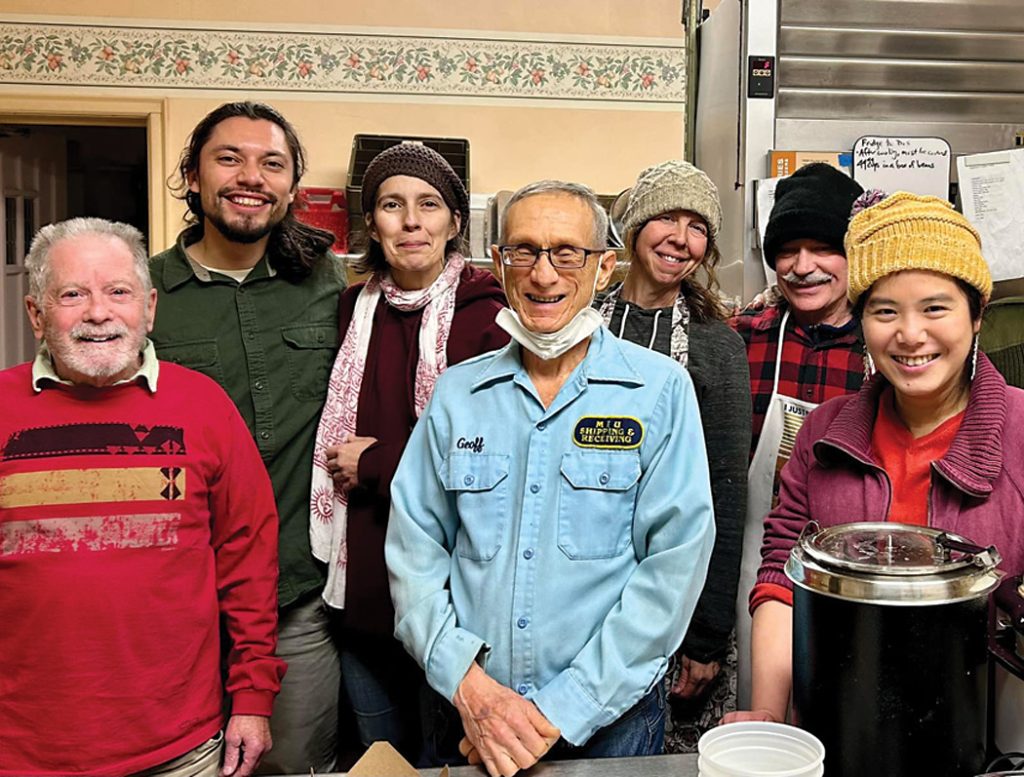
Last fall I began inquiries for a series of articles about Iowans who volunteer their time. As suspected, the region is riddled with a bunch of do-gooders. (Thank you!) These two nonprofits helping feed those in need make a particularly delicious duo.
Stone Soup Kitchen
I’ve been to the Stone Soup Kitchen at Golden Magnolia Sanctuary in Fairfield a few times now. What a pleasure it is to eat a fresh, healthy meal you don’t have to cook yourself. Especially when the food is hot and ready for you—and you can pay whatever’s in your pocket that day, even if sometimes that is nothing at all.
On my first visit, the volunteer staff served my buddy Dave and me a vegan variation of shepherd’s pie—the ultimate comfort food: mashed potatoes with savory seasoned veggies including greens, carrots, and corn, with spicy house-made hot sauce on the side and freshly baked bread.
As we filled our bellies, another customer finished his meal and crossed the room to serenade us on an upright piano, positioned next to a giant bookshelf full of games meant for anyone to play.
Suddenly a ten-year-old kid (or thereabouts) burst through the door, bicycle in tow, soaked to the bone from the rain coming down outside the former Presbyterian church basement. He ordered himself a dinner, sat down nearby with his tray, and took a hungry biteful.
He called to us cheerfully from his table, “Boy, a hot meal sure tastes good on a cold, rainy day, doesn’t it?!” The boy was clearly alone and didn’t seem to mind in the least. We couldn’t help but wonder what his story was, but it made me happy to know that he could help himself three nights a week to a wholesome meal here if he wanted it. I waved to him as I left, and threw a few more dollars in the “pay-what-you-may” cash box on my way out the door.
A Serendipitous Start
For Tammy Haessler and Adriene Crimson, the Stone Soup Kitchen located at Golden Magnolia Sanctuary, Fairfield’s Presbyterian Church-turned-community-space, has been a long time coming.
Caring for people has always been Tammy’s trade. “Whether it was a group home, home health care, or working in a school, I’ve always just taken care of people,” she says. “We had an organic farm when my older two were quite small. I always talked about making food and taking food to people who needed it. That’s something they remembered that I’d forgotten I told them.”
A few years back, when the old church building came on the market for a song, Tammy knew she wanted to buy it and fulfill some pretty big dreams. She told her realtor right away, but said, “I can’t do it alone.” Her realtor replied, “Hang on. There’s someone I want you to meet.”
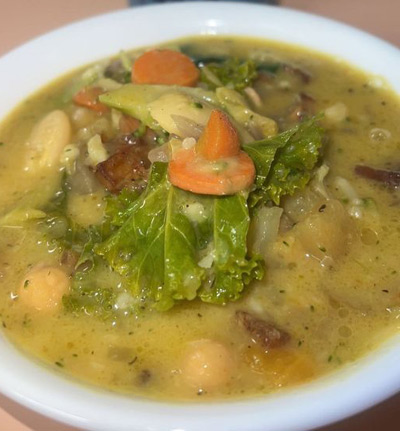
Adriene Crimson has been cooking since she was 12. “Baking mostly,” she says, “but I’ve been a prep cook. My mom was a caterer so I’ve done cater-waiter stuff. It’s just always been food. I like hosting events and parties, so having a community center slash soup kitchen felt good. And honestly, when I was married, I said to my husband, ‘If we don’t have kids we should do something really cool like start a soup kitchen.” Adriene had recently relocated to Fairfield when she got the call from her realtor.
“I met Tammy in the doorway over there,” Adriene says, motioning down the hall, “and within a couple of feet, the words ‘soup kitchen’ came out of her mouth and I said yes and that was that. She was wearing a ‘Good Witch’ t-shirt, and I was like, yeah.”
The two women now work and live in the old church building with their families. Adriene says, “Our intention was to open it up to the community and do activities, and the soup kitchen was our main priority. Our first focus.”
Serendipity also connected the pair with vegan baker and chef Cheyenne Holliday, who one day was selling vegan cupcakes next to Tammy at the Fairfield Farmers Market. Cheyenne is now kitchen manager at Stone Soup Kitchen.
“The thing that we like the most is that people who otherwise wouldn’t be having a hot meal can come in and be in community and feel good about themselves,” Adriene says. “And that people who can afford to eat anywhere come in and eat our food and hang out. That’s the thing that we love.”
“That’s our goal,” adds Tammy, “Bringing the community in to meet each other, from the wealthiest to the most in need.”
Hearty vegan menu items range from tasty bean or veggie soups, chili with cornbread, rice and bean bowls, potato dishes, and green salads, to fresh baked bread and even desserts—with goodies often donated by Breadtopia Bakehouse or Bountiful Bakery. And don’t forget that house-made hot sauce.
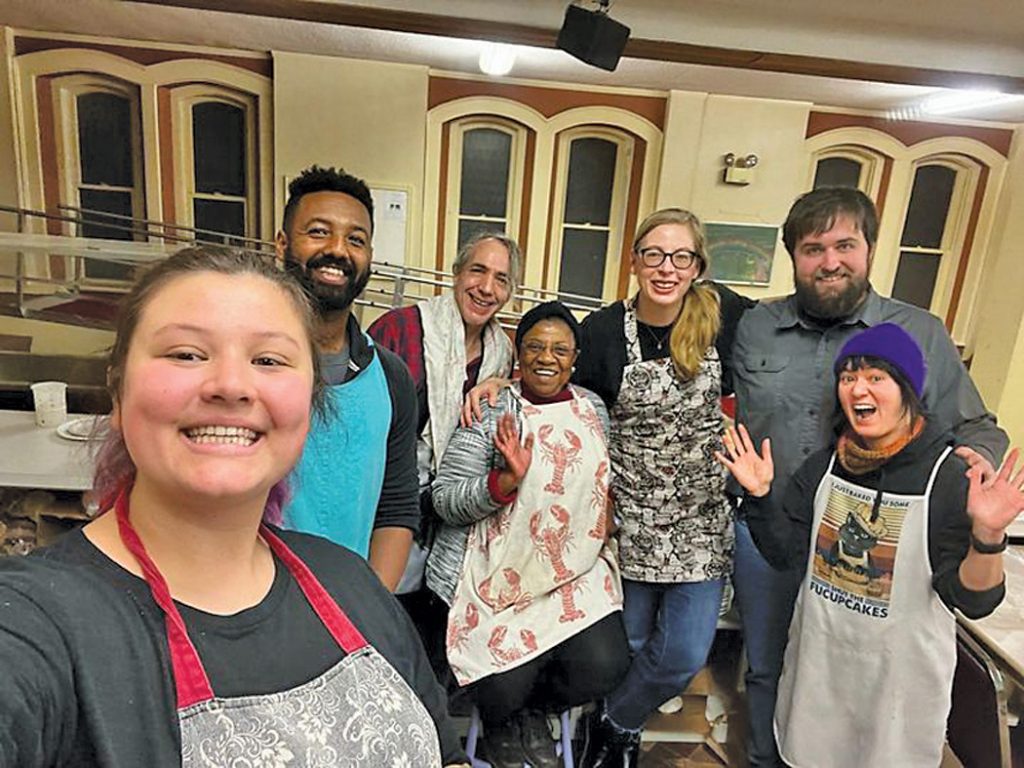
“The farmers at the regenerative organic agriculture farm on MIU campus love to grow peppers and there are always leftovers, sometimes bushels,” Adriene tells me. Letting nothing go to waste, she has mastered the art of the cooked-pepper hot sauce, made a little differently every day depending on what ingredients they have on hand to add to their prepped and cooked peppers—usually tomatoes, vinegar, garlic, stock, maybe even carrots. “But I have learned that when prepping spicy peppers, you will get into an altered state,” Adriene laughs. “It’s that capsicum. That stuff is powerful!”
The Stone Soup Story
As the European Stone Soup folk story goes, hungry strangers convince the people of a village to each contribute a humble ingredient, a “garnish” really, to a pot of boiling water with a stone in it—with the promise of getting a yummy helping. Everyone wants a taste of this mysterious stone soup, so everyone gives a little something, and all of those little somethings are what create the delicious meal for all to enjoy.
When it comes to the endeavor at Golden Magnolia, amazingly, miraculously, the Stone Soup motto describes much more than just what’s for dinner. “Every time we figure out what we need to ask for,” Adriene says, “it usually shows up pretty quick.”
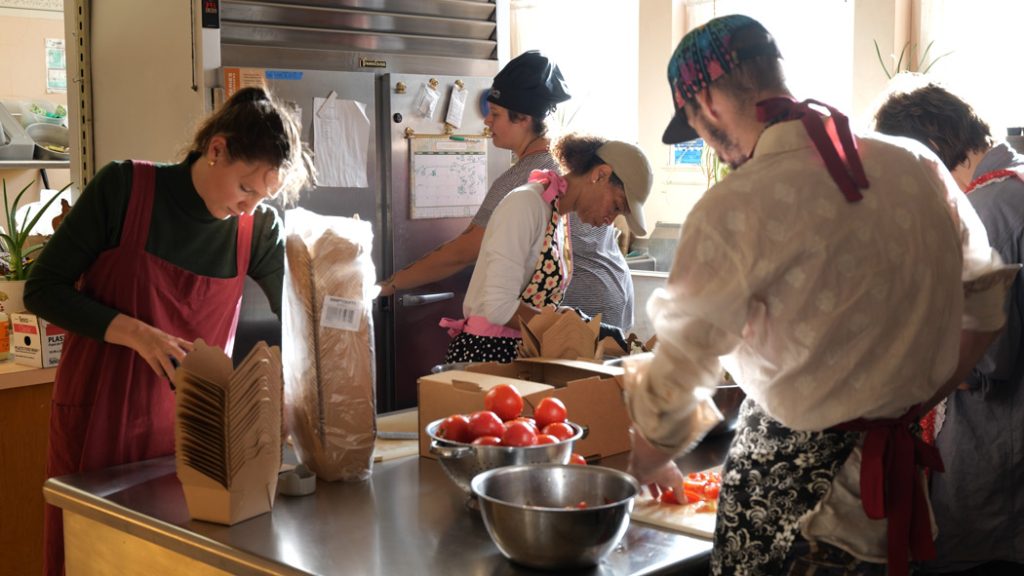
Donations have come in many forms and from all over. One of their most generous donors “grew up here, broke, sometimes not knowing where she was going to get a meal,” says Adriene. “She’s not even here, she lives in Japan. And we got a check once from someone we’d never met, it had no note or anything, and we were just like, ‘Ummm, thank you, mystery person!! Now we’re going to get a lot done!!”
A lot of the food is donated, too—especially during growing season. Farmers from the farmers market will leave leftovers sometimes. The kitchen was recently gifted a whole pallet of rice. Taco Dreams restaurant often shares their extras. And individuals will drop off little bundles of veggies. Food donations are left in the plastic cooler outside the north entrance of the church, checked several times daily.
“I really love the one onion, or the one turnip thing,” says Tammy, “It’s that little bit that gets put in the pot.”
Neighbors and friends have provided generous volunteer support—and more is always welcome. Fairfield’s Diversity Equity & Inclusion committee provides regular help with food prep, and Adriene would love to invite more small groups from local business to come in for team-building fun in the kitchen.
“A lot of people apologize for not volunteering as often as they’d like, which I think is the sweetest thing,” she says. “‘Just come to eat!’ I tell everybody, ‘If you want to volunteer, but don’t have time, just come to eat, cuz that’s just as helpful!’ We want more people in there!”
Building Community
Open since August 10, 2022, the Stone Soup Kitchen, offering supper and community on Thursday, Friday, and Saturday nights from 5:30–8 p.m., now serves an average of 200 people every week, and that number is still growing. Last month was busy enough that supplies and utilities were both paid for with the money coming in from the kitchen.
Next on the Stone Soup Kitchen wishlist is transforming the community room into a cafe/gallery space that’s beautiful, clean, and cozy—a space that invites musicians, creative writers, and game lovers to come, spend an evening with friends, make music, meet new people, and enjoy their community.
“We have one mom with her little one who comes in every night, and they play games,” says Adriene. “It’s just something different, she doesn’t have to cook, she doesn’t have to be alone. Not that I’m happy she’s crying, but she thanks us with tears in her eyes.
“We have families of 10 or 12 coming in to get meals. Or people who can’t feed themselves because they recently had a stroke—they have friends coming in to get them food. We’ve had a book club host their meeting here. We want people to come and use the space.”
Stay tuned, I’m told, for a possible Monopoly tournament.
Looking to share your talents? The sound system in the community room is on the fritz, the lighting needs an upgrade, “and assistance with getting the community room floor resurfaced would be amazing!” says Adriene.
These two women live to give—and the people who come into contact with their soup kitchen get inspired to give right back. There’s no doubt in my mind their wishes for this space and the people who share it will soon be fulfilled. That’s a good stone soup.
Stone Soup Kitchen is located at Golden Magnolia Sanctuary, 200 S. Main Street, Fairfield. Enter on the north side. Learn more at Linktr.ee/GoldenMagSanctuary.
Urban Bicycle Food Ministry
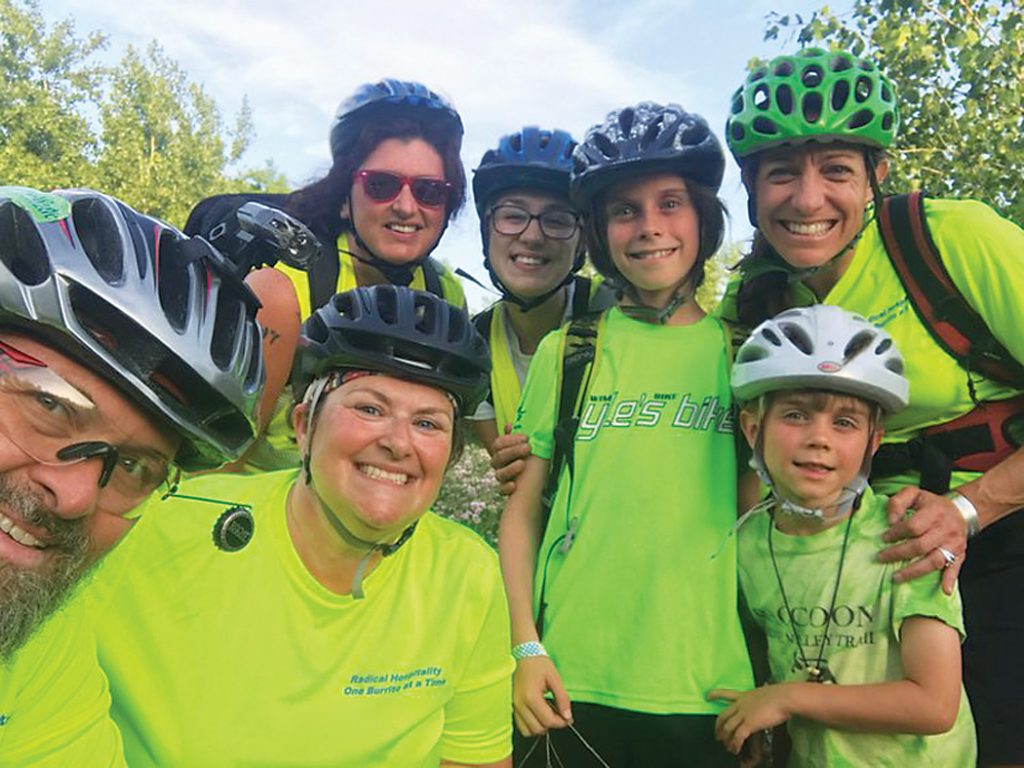
The Urban Bicycle Food Ministry of Des Moines started with 25 burritos and 20 bottles of water. “Eight years later,” says CEO Robby Collier, “we make 700 burritos, 300 turkey sandwiches, and 300 peanut butter and jelly sandwiches every Thursday.”
A weekly hoard of volunteers gathers at Capitol Hill Lutheran Church at 4:45 p.m. to prep the food, and at 6:15 p.m., teams of four embark on seven different routes to deliver supper across central Des Moines to those who need it most.
“It’s a very simple mission,” Robby says. “We make food and we give it away. We demonstrate radical hospitality one burrito at a time—with grace, love, respect, and hope.”
This ministry does a whole lot more than bike burritos and bananas around town. They also hand out coats, caps, gloves, blankets, socks, and toiletries. “Anything the homeless would need,” says Robby. “If we get tents, we’ll hand out tents.”
In warmer weather, five of their seven delivery routes are done on bicycles. Teams pedal out together to distribute supper, and often supplies, depending on what’s been donated that week. In the wintertime all seven routes are done by car. “That allows us to carry more blankets, coats, caps, and gloves, and supplies for our homeless friends on the streets,” says Collier.
Urban Bicycle Food Ministry Des Moines is an interfaith and non-denominational organization. And as stated on their website, “Anyone and everyone is welcome to be a part of this ministry. We do not preach, proselytize, or try to convert.”
Stories from the Street
The ministry serves a minimum of 300 to 400 people a week, “and it’s not just the homeless,” explains Collier, “it’s also the food insufficient. We’ll hit some low-income apartments and housing and so on—something to get them through the next day. We pull over and ask them if they’ve had supper tonight.”
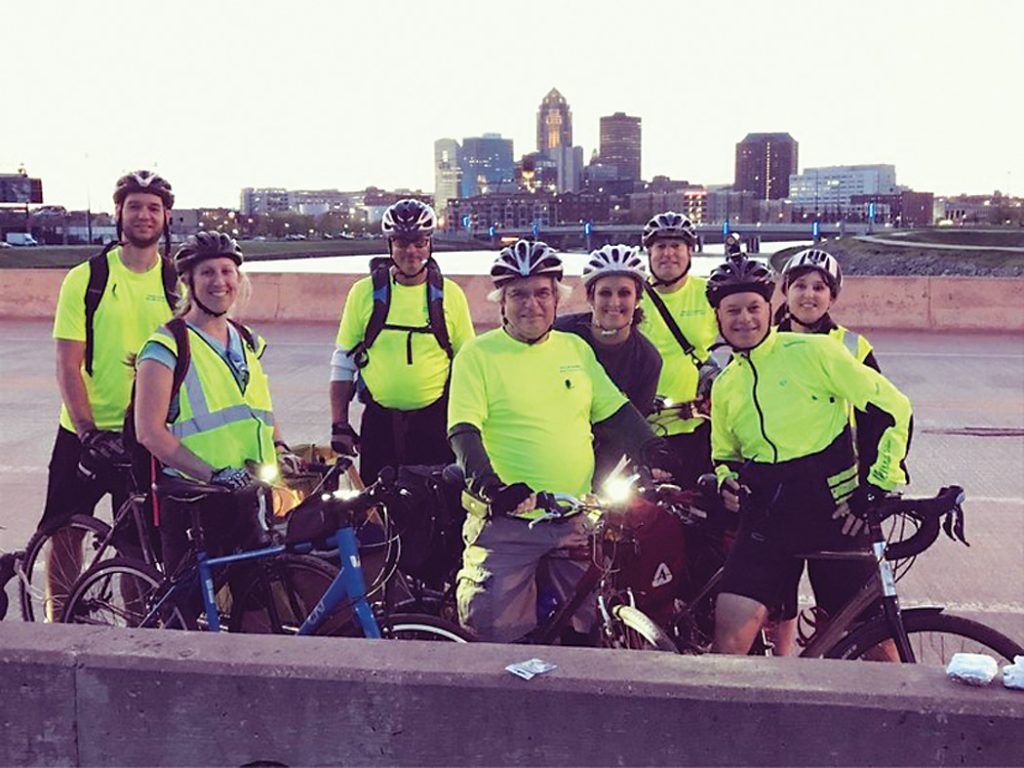
After eight years, a lot of people know who they are, and their fluorescent yellow shirts make the UBFM riders pretty easy to spot. “What they do is they’ll holler, ‘burrito slingers!’” says Collier, “and we’ll pull over and we’ll get ’em some food.
“For newer people, we’ll pull up and ask if they’ve had supper, explain who we are, and ask them if they’d like a burrito or a sandwich or water. And once we build a relationship with these people, then we’ll start talking to them about, you know, do you need socks, do you need any toiletries, do you need gloves, or something like that.
“We try to supply them with what we can. If we can give them a hug, a word of encouragement, give them a burrito, just talk to them.
“You know there are stories that we call ‘stories from the street.’ We talk about those. There are also some positive stories—where people have gotten housing. We’ll see them later on, and they’ll tell us, ‘I’m in an apartment now,’ and it’s just great to hear.”
One particular story stays with Robby all the time. “There was a gentleman I met. His name is Jim. We saw him downtown. I rolled up on him and I said, ‘Hi, my name is Robby and I’m with Urban Bicycle Food Ministry, have you had supper tonight?’ and he said, ‘No. Whaddya guys got?’ and I explained what we had and said, ‘What’s your name,’ and he goes ‘My name’s Jim,’ and I say, ‘It’s really nice to meet you, Jim, we’re out every Thursday night, are you usually in the same area?’
“We saw him the next week and rolled up on him and I said, ‘Hey, Jim, how’s it going?’ This kills me. Get a little emotional here. And he starts crying, I said, ‘Jim, what’s going on??’ He says, ‘Nobody ever remembers my name.’
“It’s something so simple as remembering somebody’s name. We always say the homeless are in plain sight. A lot of people will look past them, look through them. Say something discouraging.
“We don’t care what situation you’re in, why you’re out there, whatever happened. We’re just there to support you. Enable you to get to the next day, even if it is just a burrito, or a hug, or a kind word.”
Robby started six years ago as a volunteer. “I rolled up on my bike, didn’t know what I was doing. I fell in love with it the very first time I was there. And six years later I took over as CEO Chief Burrito Slinger. I love what I’m doing. I love the passion of the volunteers, I love the people that show up, I love the people we serve. There’s a verse in the Bible, ‘Truly I say to you what you have done for the least of these you have done unto me,’ and I kinda take that to heart.”
Many Ways to Give
Collier half jokes that “the ultimate goal of UBFM is to be out of business. But we see a lot of new faces, so we’re looking at expanding to another route. It takes more volunteers, donations, both monetary and in-kind.”
Monetary donations are used to purchase the food, which costs about $1,200 a week. “We’re so grateful for the people who see us on Facebook and have never shown up but appreciate what we do and contribute.”
The in-kind donations—the coats, caps, gloves, socks, batteries, flashlights, toiletries—get dropped off on Thursday nights at Capitol Hill Lutheran Church. And in the cold season, local charities help out with coat and blanket drives. “We can go through 50 blankets a week in the winter,” says Robby. “When their stuff gets wet or cold, you know, it’s hard for a homeless person to be able to run to the laundromat.”
Depending on the week and the season, between 50 and 70 volunteers show up to lend a hand or some pedal power.
“Some people come and just make food. Some people just come and do the distribution,” says Collier. “If you’re curious about volunteering, just show up on a Thursday! Come in at 4:30-4:45, and we’ll greet you, sign the waver, we’ll put you to work. We’ll teach you to square a burrito. We’ll show you how to make a sandwich, and we’ll get you signed up on a route if you want.”
Volunteers range from from 5 to 6 years old up to folks in their 80s. “We’ve had homeless people who’ve come and helped us,” adds Robby. “We’ve served them on the streets and they’ve come and helped—regular volunteers, now they’ve gotten some housing.
“We always talk about, you know, how we change the lives of the people we serve, but it also changes the lives of the people that serve. It’s really changed me,” he says with a lump in his throat. “The people I’ve met.”
“I see on Facebook,” he adds, “‘It’s cold outside, bring your pets in.’ Well, it’s cold outside, let’s bring our humans in, too. We need more resources. But we do what we can with what we have.”
Urban Bicycle Food Ministry is located at Capitol Hill Lutheran Church, 511 Des Moines Street in Des Moines. Learn more at Ubfmdsm.com.
